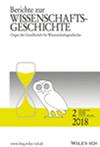笛卡尔论位置与运动》:笛卡尔评注读本》。
IF 0.4
2区 哲学
Q2 HISTORY & PHILOSOPHY OF SCIENCE
引用次数: 0
摘要
本文重构了荷兰笛卡尔派(Henricus Regius、Johannes de Raey、Johannes Clauberg 和 Christoph Wittich)对笛卡尔位置与运动思想的解释。研究的重点是笛卡尔对《哲学原理》(1644 年)的解读,尤其是对该书的口述评注。书中展示了这些注释如何为笛卡尔带来新的亚里士多德-经院哲学的潜在渊源,以及荷兰笛卡尔主义者如何借助这些渊源,以不同的方式将笛卡尔文本的基本原理凸显出来:通过这样做,他们形成了一个哲学流派。本文章由计算机程序翻译,如有差异,请以英文原文为准。
Descartes on Place and Motion: A Reading through Cartesian Commentaries**
This paper offers a reconstruction of the interpretations of Descartes's ideas of place and motion by Dutch Cartesians (Henricus Regius, Johannes de Raey, Johannes Clauberg, and Christoph Wittich). It does so by focusing on the reading of Descartes's Principia philosophiae (1644) offered, in particular, by the dictated commentaries on it. It is shown how such commentaries bring to the light new potential Aristotelian-Scholastic sources of Descartes, and the different ways Dutch Cartesians brought to the fore, also with the help of such sources, the rationale of the Cartesian text: in doing so, they constituted a philosophical school.
求助全文
通过发布文献求助,成功后即可免费获取论文全文。
去求助
来源期刊

Berichte zur Wissenschaftsgeschichte
社会科学-科学史与科学哲学
CiteScore
0.80
自引率
16.70%
发文量
43
审稿时长
>12 weeks
期刊介绍:
Die Geschichte der Wissenschaften ist in erster Linie eine Geschichte der Ideen und Entdeckungen, oft genug aber auch der Moden, Irrtümer und Missverständnisse. Sie hängt eng mit der Entwicklung kultureller und zivilisatorischer Leistungen zusammen und bleibt von der politischen Geschichte keineswegs unberührt.
 求助内容:
求助内容: 应助结果提醒方式:
应助结果提醒方式:


